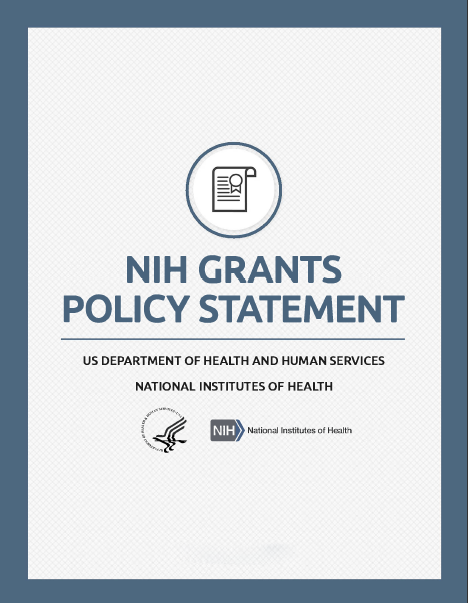You are here
Working with NIH
Sponsor-specific tools and resources for working with the National Institutes of Health (NIH)

NIH Grants Policy Statement
Visit the NIHGPS site for the latest version.
Salary Cap
The Office of Personnel Management has posted the new Executive Level salary cap for 2025 as $225,700, effective January 1, 2025. See NOT-OD-25-085
NIH Data Management & Sharing Policy and Resources
NIH now requires researchers to submit a Data Management and Sharing Plan (DMS Plan) with all new grant applications. This policy applies to all research, funded or conducted in whole or in part by NIH, that results in the generation of scientific data. There are a number of resources available to U-M researchers to help prepare for this policy change.
NIH Grant -Related Data Sharing Costs
Data Management and Sharing (DMS) costs should be shared in the appropriate cost category, e.g., personnel, equipment, supplies, and other expenses, following the instructions and providing details as instructed within the applicable form (e.g., R&R Budget Form or PHS 398 Modular Budget Form). See full details in Notice NOT-OD-23-161.
Learn more about budgeting and direct costs on ORSP's Budget and Cost Resources page.
DMS Plan Oversight
In most cases, the DMS Plan oversight at U-M will be provided by the principal investigator (PI) and other study personnel. If help is needed, consider these resources:
- OVPR Research Data Stewardship page - NIH DMSP resources
- U-M Library - Research Guides - Research Data Management
- U-M Navigate Webinar - NIH Data Management & Sharing Policy (Nov 1, 2022)
DMSP Template and Samples
- DMS Plan Format Page (Word doc) provided by NIH
- DMPTool - https://dmptool.org/
NIH Forms-I Application Package Resources
This U-M worksheet for FORMS-I is intended to help Research Administrators (RAs) collect the detailed data and scientific questions they will need from principal investigators (PIs) to more readily complete the PHS Human Subjects and Clinical Trials Information Form in the eResearch Proposal Management System (eRPM).
NIH Updates for Subaward/Consortium Written Agreements
Effective January 1, 2024, NIH’s Policy Guidance for Subaward/Consortium Written Agreements, requires international subrecipients to provide access to copies of all lab notebooks, all data, and all documentation that support the research outcomes as described in the progress report to the primary recipient with a frequency of no less than once per year, in alignment with the timing requirements for Research Performance Progress Report (RPPR) submission.
Principal Investigators on NIH projects with foreign subrecipients must ensure that access to such lab notes, data, etc, is provided in alignment with the timing of RPPR submissions. Cases of subrecipient non-compliance must be reported to [email protected].
NIH will not support any agreement that does not meet the minimum requirements outlined in this notice.
The Office of Contract Administration (OCA) and the Office of Research and Sponsored Projects (ORSP) have worked together to update the subrecipient form / letter of commitment (LOC).
Additional Resources: NOT-OD-23-182, Subawards, FAQs, or contact us at [email protected].
NIH Appendix Reminder
The only allowable appendix materials are:
For applications proposing clinical trials (unless the FOA provides other instructions for these materials):
- Clinical trial protocols
- Investigator's brochure from Investigational New Drug (IND), as appropriate
For all applications:
- Blank informed consent/assent form;
- Blank surveys, questionnaires, data collection instruments;
- FOA-specified items. (NOTE: If appendix materials are required in the FOA, review criteria for that FOA will address those materials, and applications submitted without those appendix materials will be considered incomplete and will not be reviewed.)
NIH, Uniform Guidance, and Prior Approvals
Refer to Federal Research Terms and Conditions, housed on the NSF website.
NIH Links
- Understanding NIH Grant Numbers (NIH Website)
- Deciphering NIH Application Numbers (NIH PDF)
- Standard NIH Due Dates (NIH)
- Frequently Asked Questions (FAQs) (NIH)
- Case Studies (NIH)
Newsletters from NIH
Subscribe to NIH offers email newsletters and, including the periodic NIH eSubmission Items of Interest.
System Help from NIH
Contact the NIH electronic research administration (eRA) Service Desk. Preferred method is to submit a ticket on the NIH website.
- Phone: 301-402-7469 (Press 1 for eRA Commons or ASSIST)
For information/questions on:
- ASSIST
- eRA Commons
- eRA Commons Registration
- eRA errors and warnings
- Application Status
- Post-award administration
Related ORSP or U-M Links
Questions?
First, always read the guidelines of your funding opportunity or the award. Additionally, contact your ORSP Project Representative for sponsor-specific questions.
National Institutes of Health (NIH) or electronic research administration (eRA) Service Desk. The preferred method is to submit a ticket on the NIH website (grants.nih.gov/support).
- Toll-free: 1-866-504-9552 (Press 1 for eRA Commons or ASSIST)
- Phone: 301-402-7469 (Press 1 for eRA Commons or ASSIST)
- Hours: Mon-Fri, 7 a.m. to 8 p.m. Eastern Time (closed on federal holidays)
Note that the Service Desk's busiest hours are between 10 a.m. ET and 3 p.m. ET.